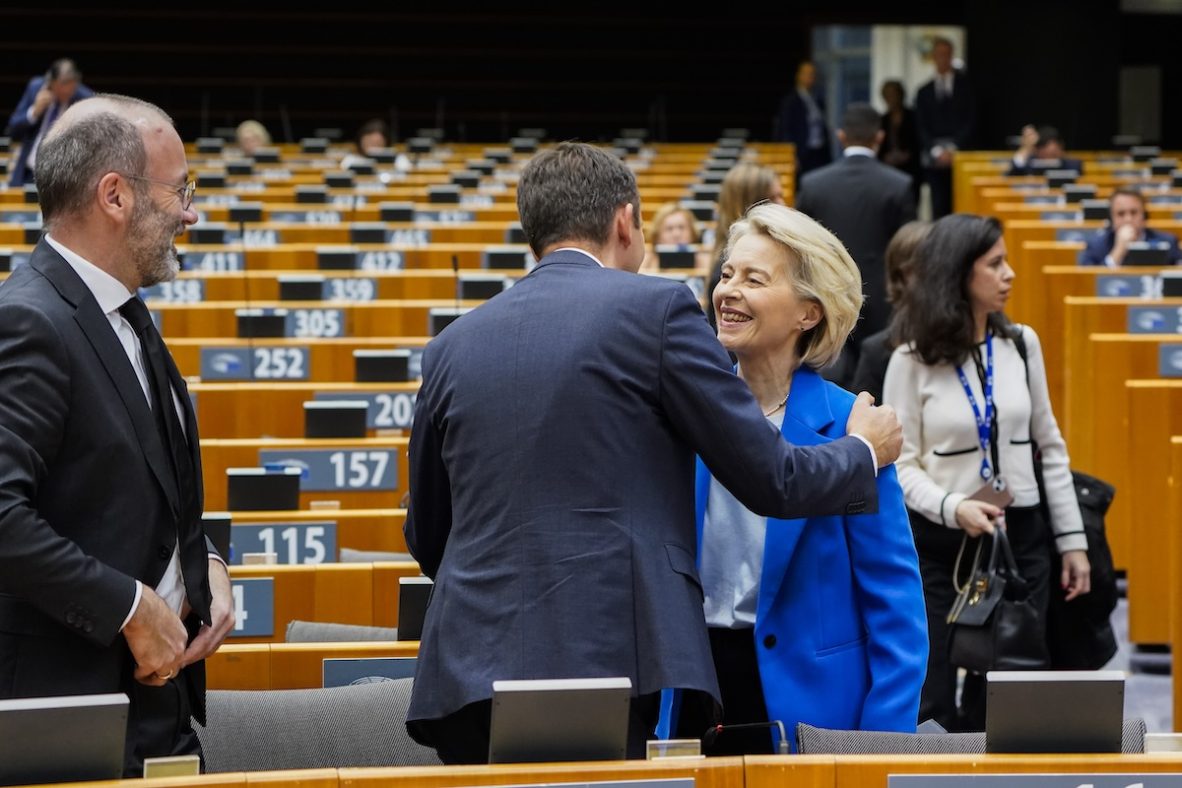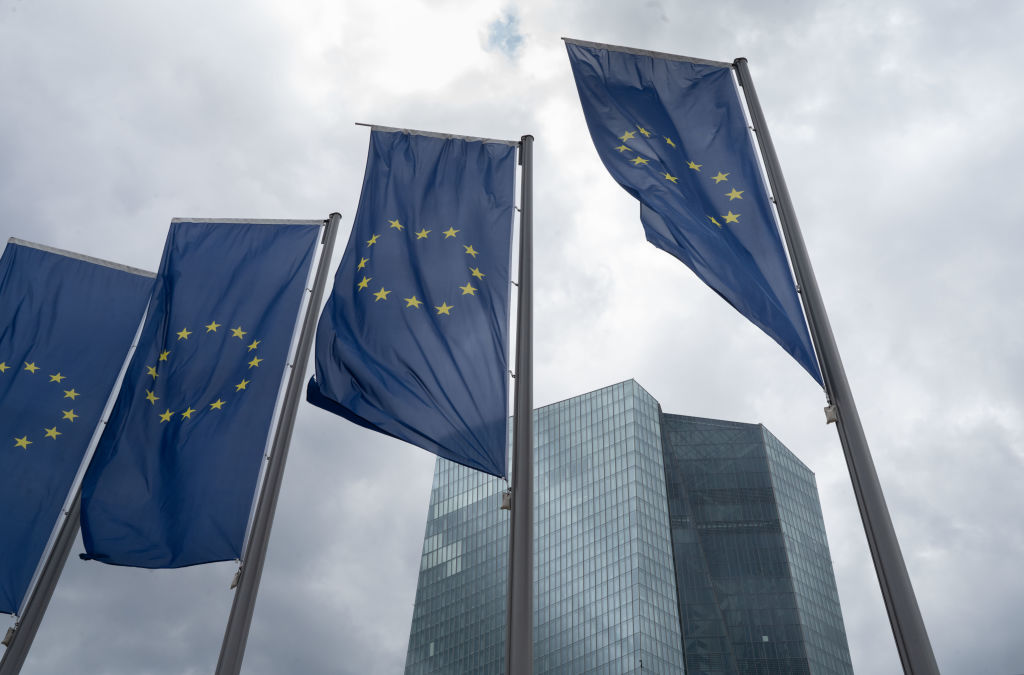Make the pensioners solve the pensions crisis

Welcome to EURACTIV’s weekly Economy Brief. You can subscribe to the newsletter here.
While the public pension reform dominates French political debate, demographic changes will eventually push all EU countries to consider how they finance their pensions systems. One solution? To make pensioners themselves pay.
As the bill on the French pensions reform is set to reach Parliament on Monday (30 January), social tensions run high, and trade unions have taken to the street in a rare show of unity to fight it down.
The existence of a short-term structural deficit in the pensions system is undeniable. The French pensions analysis body, the Conseil d’Orientation des Retraites (COR), focused on a number of scenarios that all say the same thing. Under long-term economic growth of 1.3%, the deficit is due to reach 0.5% of GDP by 2032, before slowly closing by 2043.
Funding the deficit through no other means than public debt issuance is just another burden added on the shoulder of the next generation, and would cost approximately €6 billion a year, according to one estimate.
Too young to retire
As a consequence, the government has made the decision to raise the legal retirement age from 62 to 64. At the same time, 43 years worth of social contributions will be required to secure a full pension. Specific policy adjustments will be enshrined in the bill to support the most at-risk, and those who have been working the longest.
This is arguably the easiest and fastest way to get more cash into the pensions system: People work longer and thus pay more social contributions. To a certain extent, raising the minimum age also helps bolster old-age employment.
Finally, the government is quick to remind the nay-sayers that France is a European oddity: In practice, pensions spending is one of the highest across the board, reaching 14.8% of GDP in 2018 (down to 13.8% in 2021), against the EU-wide average of 12.4%.
Rich get richer, poor get poorer
The real issue with the reform is the inequity it creates. Those most impacted by the reform are workers just a few years away from retirement, and whose retirement plans are being revamped largely against their will.
But younger workers are also heavily impacted.
For the past 30 years, pensions have been indexed on inflation rather than salaries. Bar the past few months, salaries have always increased at a faster rate than inflation. In practice, this means that someone retiring by 2070 will see their standards of living fall to 75.5-87.2% of what they experienced whilst working, relative to the rest of the population. In 2019, retirees were better off than when working, at 101.5%, according to the COR.
Ultimately, today’s workers are paying the full cost of the inflationary crisis in the short run. They are helping old people who have just retired get richer than they were whilst working, they are being asked to work more, and they will see their standards of living fall when they retire themselves.
Silver economy has gold to give
That is why French and European political leaders should start looking at another source of funding: retirees themselves. On average, they are richer than their working counterparts – pensions pay might be less than a worker’s salary, but they often no longer have children at home, and a large portion of them are homeowners.
The COR found that pensioners’ net wealth (total wealth minus debt) is 35% higher than their working counterparts.
The statistics arm of the ministry for health and social protection DRESS estimates that median life standards reached €2310/month/retiree in 2019; that is, 9.5% higher than the rest of the population.
The richest 10% of pensioners earn more than €3,200/month net, with 1.7% of the retired population (just over 250,000 people) earning over €4,500/month net, according to DRESS’s figures.
There is a political argument, too: baby boomers have, on average, had it easier up to retirement, with generally higher growth and lower unemployment rates. The idea that they should somehow pay back through an “intergenerational pact” isn’t so far-fetched.
Deindexing existing pensions from inflation, in a context of rising prices, could also create short-term savings: a 1% deindexation for those earning more than €2,000/month net (25% of the entire retirement cohort) could bring €1 billion into the government’s pocket, research found.
A more radical take would be to create a maximum pensions pay – and work has already been done to determine how much that would be.
Centre-right governments will try to avoid policies that make pensioners worse off since they are a reliable source of votes, and tend to vote more often than other social categories. But making only today’s workers pay by increasing the legal retirement age is unfair. If all must do their part to reform the pensions system, then get pensioners to pay as well.
Help us improve the Economy Brief
We would like to hear your input on how to improve our newsletter. We would appreciate if you could take a minute and fill in your feedback in the survey below.
Complete the survey here
Chart of the Week
With the French pensions reform underway, the same argument keeps coming back over and over again: old-age (55-64) employment is lower in France than in the rest of the EU. The graph below shows there is quite a bit of truth to it.
Graph by Esther Snippe.
To tackle the issue, the government’s novel policy so far is the creation of a “seniors index” that aims to track how good company retention of old-age workers actually is. It will be compulsory for companies to publish their workforce ‘index’ by age group, or risk being penalised.
Unions and employers’ federations have so far laughed at the idea: it ignores sector-specific realities, and the penalties apply to making the ‘index’ public – but not to doing anything about it.
“We need to rethink our approach to employment across our entire careers, including normalising access to professional training,” Philippe Seidel Leroy, Policy Manager at Age Platform Europe, told EURACTIV. Yet, this is hardly where the French government’s mind is at for the time being.
You can find all previous editions of the Economy Brief Chart of the Week here.
Economic Policy Roundup
EU auditors to assess rule of law protection in EU funding. The European Court of Auditors announced on Monday (23 January) it would start assessing the Commission’s protection of the EU’s financial interests against rule of law violations in Bulgaria, Greece, Italy, Hungary, Poland and Romania. The audit, expected to be published in one year, will focus on the conditionality regulation, recently applied in Hungary, the 2021-2027 cohesion funds, and COVID-19 recovery funding.
Parliamentary economic committee decides position on bank capital requirements, disappoints climate and finance NGOs. On Tuesday (24 January), the ECON committee of the European Parliament voted on its position regarding the revision of the bank capital requirements directive and regulation. The lawmakers agreed on an “output floor” that sets a minimum amount of capital requirement that banks need to hold irrespective of their own risk models. Regarding environmental risks to financial stability, the lawmakers could only agree on increased disclosure requirements and not, as some NGOs had advocated, on a one-for-one rule. This rule would have required banks to back loans to new fossil fuel projects by 100% of their own capital. As a next step, Parliament will enter into negotiations with member states.
MEPs adopt trilogue agreement on pay transparency. On Wednesday (25 January), MEPs from the employment and women’s rights committees voted in favour of the agreement on pay transparency rules reached by the institutions in December. “We are finally securing the binding legislation needed to tackle pay discrimination across the Union,” said Samira Rafaela, one of the co-rapporteurs on the file. The Parliament will now have to formally approve the agreement as well as EU member states.
Swedish presidency to boost gender mainstreaming approach in EU policy. The Swedish presidency of the Council will push to integrate a gender approach in the work of the EU institutions, Swedish minister for gender equality Paulina Brandberg told EURACTIV after presenting the presidency priorities to MEPs on Wednesday (25 January). “For gender equality work to be efficient, it needs to be integrated in all policies, all budget processes, all political work,” she said.
EU Commission wants to strengthen social dialogue. On Wednesday (25 January), the EU Commission presented a new communication and a proposal for Council recommendations to strengthen social dialogue to strengthen the involvement of social partners in the decision-making processes in member states.
Commission reconsiders EU-Ukraine agri-food trade liberalisation. The European Commission is mulling over reconsidering the special suspension for all tariffs and quotas on Ukrainian agri-food exports over the coming weeks after complaints from member states that an influx of agricultural goods is putting EU farmers at a disadvantage. Read more.
Economy news from the Capitals
French unemployment levels reach 11-year low. The number of job-seekers in France dropped by 3.6% in the last quarter of 2022 to 3.05 million, the lowest figure since 2011 but the French Central Bank warned that the unemployment rate might increase again in 2023. Read more.
Belgium’s budget deficit now highest in Eurozone. Belgium registered a budget deficit that amounted to 5.1% of its GDP in the third quarter of 2022, the largest in the Eurozone countries in that period, Eurostat data from Monday reads. Read more.
German government forecasts minimal growth for 2023. The German economy, which grew 1.8% in 2022, is expected to only grow 0.2%, according to a government forecast presented by Economy Minister Robert Habeck. Read more.
Austrian industry sees signs of economic stabilisation. Austria is on its way to recovering from the economic crisis that was triggered by the pandemic and the war in Ukraine, the Federation of Austrian Industries said. Read more.
Spanish anti-inflation package approved despite right-wing abstention. Parliament gave its final approval on Tuesday to a fresh anti-inflation package the government presented in the form of a decree to help mitigate the impact of high energy prices on food products. Read more.
Finland on its way to dismantling state monopoly on gambling. The Finnish state is on its way to ditching its 80-year monopoly over gambling as the country’s three biggest parties have decided to make a last effort before elections in April to reform a sector that faces increasing challenges from foreign, unregulated, and digitally savvy competition. Read more.
Monaco’s anti-money laundering system inadequate, risks name-and-shame. A Council of Europe report published on Monday and seen by EURACTIV highlights key vulnerabilities in Monaco’s measures against money laundering and the country risks being placed under intense scrutiny by the international Financial Action Task Force (FATF) watchdog. Read more.
Literature corner
Instantaneous Inflation: This paper by Economy Professor Jan Eeckhout argues that looking at yearly inflation numbers distorts the picture and can lead observers to see changes in the trend to late. He lays out a different way of presenting inflation numbers that puts more weight on more recent developments. In this way of looking at it, he says that inflation in the US and the euro area is already back to the target of 2%.
The labour market in Ukraine: Rebuild better: Marianna Kudlyak, Oleksandr Zholud, Tito Boeri, and Giacomo Anastasia write about how Ukraine’s labour market could be restructured to allow a swift reconstruction.
[Edited by János Allenbach-Ammann/Nathalie Weatherald]








